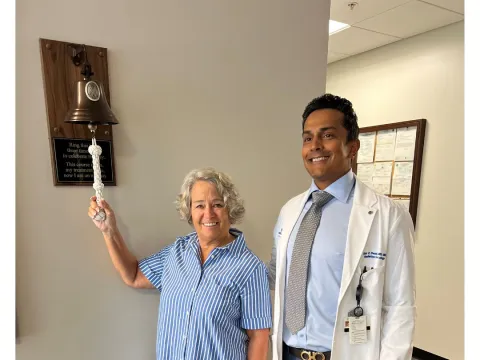- Megan Paquin

The AdventHealth Neuroscience Institute will lead first-of-its-kind research on exercise and brain health as part of a national, multisite effort funded with $11 million from the National Institutes of Health (NIH), the largest source of medical research funding worldwide.
Known as Follow-up Longitudinal Analysis of Moderate-intensity Exercise (FLAME), this new effort will test the long-term effects of a previously conducted randomized exercise clinical trial initiated in 2016 called “Investigating Gains in Neurocognition in an Intervention Trial of Exercise, (IGNITE)," which examined the effects of exercise on cognitive and brain health in cognitively normal older adults.
For the first time, FLAME will examine whether participating in a moderate-intensity exercise intervention influences the rate of cognitive performance changes and risk for Alzheimer’s disease pathology five years later. The FLAME study will also examine the extent to which participants maintained the exercise routines they started in the IGNITE study and determine whether there are any factors predicting long-term adherence to exercise behaviors. In short, the study could help establish evidence for long-term engagement in physical exercise as a leading approach to reduce the risk for age-related cognitive decline and dementia.

“With the number of new Alzheimer’s disease cases expected to exponentially grow, we are interested in how we can continue to capitalize and leverage the natural properties of the brain to maintain and improve brain function,” said lead researcher Kirk Erickson, PhD, director of translational neuroscience at the AdventHealth Neuroscience Institute. “While many believe that our brain simply deteriorates, atrophies and declines inevitably, we are finding that there are things we can do about it and that the brain retains its capacity for modification – even late into life.”
In combination with the results from IGNITE, the results of FLAME are expected to be transformative. Also funded by NIH, the IGNITE randomized clinical trial tested a diverse sample of 648 adults between the ages of 65 and 80. The FLAME study will commence with re-contacting IGNITE participants in early 2024. The goal of the study will be to re-examine brain function and re-evaluate cognition as well as re-characterize aspects of exercise behaviors, health, and physical function among participants.
“This is first time we are able to take a large, randomized clinical trial of aerobic exercise along with the rich data we gained through IGNITE to examine whether physical activity altered the trajectory of accumulated Alzheimer’s disease pathology,” added Erickson, who is also a professor of psychology at the University of Pittsburgh. “And while we know that exercise, overall, is good for us, this study may prove groundbreaking by not only expanding our understanding of how exercise affects the brain and Alzheimer’s disease but also how we motivate our patients and community to maintain a physically active lifestyle that can help reduce their risk of developing Alzheimer’s disease later in life.”
AdventHealth, the University of Pittsburgh, Northeastern University and the University of Kansas Medical Center will serve as the sites for this NIH-funded research. In addition to Erickson, study investigators include Drs. Jeffery Burns, Eric Vidoni, Chaeryon Kang, Anna Marsland, Dan Forman, Thomas Karikari, Arthur Kramer, Charles Hillman, and Edward McAuley.
Recent News

AdventHealth Avista opens food pantry to support community health
AdventHealth Avista has taken a significant step toward addressing food insecurity, a key priority identified in its Community Health Needs Assessment by opening a food pantry on its first floor. This...

AdventHealth Porter Earns COPPER Designation, Strengthening Pediatric Emergency Care
AdventHealth Porter is proud to announce that its Emergency Department has earned the Pediatric Advanced COPPER designation, a significant milestone that reflects a deep commitment to providing safe...

Three AdventHealth hospitals in Florida’s Volusia and Flagler counties earn top Leapfrog honors
Residents of Volusia and Flagler counties now have national confirmation of something many rely on every day: safe, high-quality hospital care close to home.

The hidden cancer one clinician caught – and the process improvements she says matter most
Shana Vongkhankeo, APRN, discovered an unusual thyroid enlargement during a routine physical for a teenage patient, leading to a life-saving cancer diagnosis that highlighted how being fully present...

AdventHealth debuts first-of-its-kind Performer Health Program in Central Florida
AdventHealth is launching the Performer Health Program, a first-of-its-kind initiative in Central Florida focused on addressing the unique health needs of artists and performers.

How to stay mindful in body, mind and spirit this holiday season
As holiday demands grow, mindfulness provides a simple tool to stay present and steady, offering support for the mind, body and spirit during a busy season

AdventHealth Waterman strengthens access to expert specialty care with expansion of Mount Dora medical plaza
Second floor buildout adds orthopedics, sports medicine, women’s health and heart care for Lake County.

Expanding hope through innovation: AdventHealth advances cancer care across East Florida
Cancer touches nearly every family, and in Flagler, Lake and Volusia counties, the demand for timely, advanced care keeps rising. AdventHealth’s East Florida Division, which includes seven hospitals...

For two Hope Clinic patients, music spurs recovery
STROKESTRA heals stroke survivors in so many meaningful ways.

A new chapter begins: AdventHealth Avista opens its on-campus surgery center
This milestone marks a meaningful new chapter for a team whose history stretches back more than two decades.

AdventHealth Porter Performs Rare, Complex Robotic Kidney Cancer Surgery
AdventHealth Porter has reached an extraordinary milestone in surgical innovation, completing what is believed to be the first robotic left radical nephrectomy with inferior vena cava (IVC)...

Helping the Helpers: Spotlight on AdventHealth Avista’s Director of Supply Chain, Mike Vos
For Mike Vos, Director of Supply Chain at AdventHealth Avista, caring for others isn’t just part of the job - it’s woven into his family story. With a mother who is a career nurse and now Director of...
